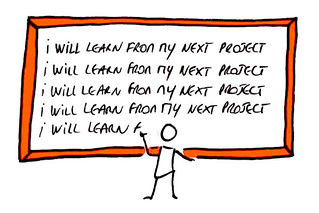This article, written in 1988 by Dennis Vetok, talks about the terminology "lessons learned" and how misused this term is. The Army has (literally) learned this lesson - industry generally has not.
"One relatively minor but inescapable
conclusion became increasingly apparent during
the course of this study. “Lessons learned” is an
unsatisfactory term as commonly used.
"In virtually
every substantive and grammatical instance,
“lesson” sufficed for the redundant two-word
noun. For a commander to report after an action,
for example, that he learned three “lessonslearned”
grates upon the tutored ear but, more
importantly, implies incomplete understanding of
the overall process. That commander may have
personally learned some lessons, but the US Army
did not.
"An army learns lessons after it incorporates
the conclusions derived from experience
into institutional form. Out of the
commander’s experience may come a lesson, and
from that lesson may come new or adapted
doctrine or perhaps dissemination of potentially
useful information. Only after its institutionalization
can the lesson be correctly described in the
past tense as a lesson learned. Until then it
remains just a lesson or usable experience, a
semantic distinction that few fully appreciate.
We need to speak of “usable experiences” or
“lessons” and avoid using “lessons learned,” for
once an army learns a lesson, the lesson disappears
into doctrine, organization tables, or training
programs.
"Lesson learning is a process, not a
product. “Lesson” alone accurately describes
processed experience, but trying to change an
everyday speech habit may be presumptuous -
and not unlike emptying the sea with a bucket.
Still, a new consciousness in terminology
represents a step toward fuller appreciation of how
an army learns lessons".





No comments:
Post a Comment